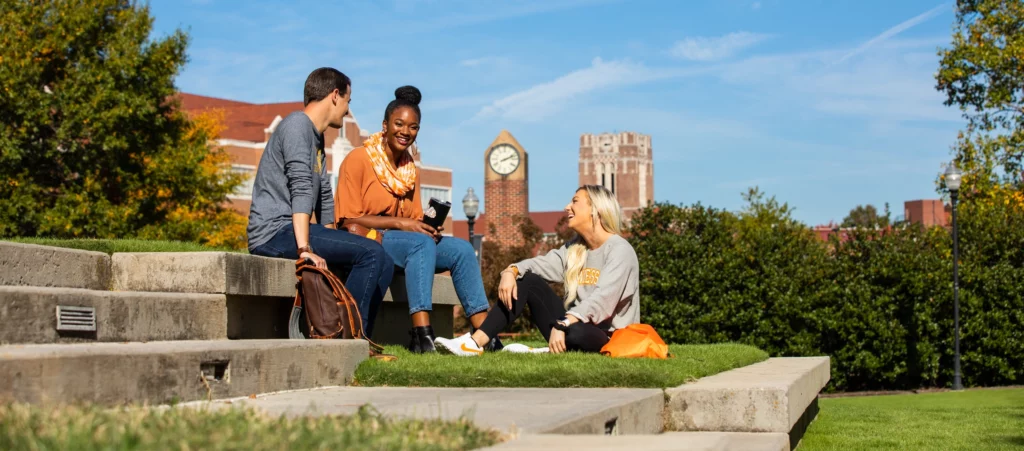
CLASSICS AND
DIVERSITY
Classics Department Diversity Action Plan
Executive Summary, March 23, 2023
The faculty, students and staff of the University of Tennessee’s Department of Classics view diversity as a fundamental ethical, societal, and cultural value. We must be inclusive and diverse in order to foster outstanding scholarship and teaching, and to work and lead in an increasingly multicultural and global society. We recognize and value diversity in its myriad forms, including status, age, ethnicity, family structure, gender, gender identity, national origin, race, religion and spirituality, sexual orientation, physical ability, socioeconomic background and veteran status. We seek to create and sustain a welcoming environment; to recruit, retain, and support a diverse body of students, staff, and faculty; to prepare students to learn, research, teach, and advocate in a diverse world; to foster scholarship that is multiculturally informed; and to further inclusion by developing and strengthening campus and community partnerships. We support intellectual endeavors from all directions, so long as they use the evidentiary standards of the discipline.
The ancient Mediterranean world has long been a source of examples for later generations to use in the pursuit of their own interests, for better and for worse. In agreement with the Public Statement from the Board of Directors of the Society for Classical Studies, the national organization of research Classicists (https://classicalstudies.org/scs-news/public-statement-scs-board-directors), we condemn “the use of texts, ideals, and images of the Greek and Roman world to promote racism or a view of the Classical world as the unique inheritance of a falsely imagined and narrowly-conceived western civilization.” The appropriation of the ancient world for the promoting of hatred and racism is injurious and wrong. The study of history requires a mature understanding of the past in all its failures and virtues, and the role that history has in the present.
Goal 1: Create and sustain a welcoming, supportive, and inclusive campus climate that allows for respectful interaction and viewpoint diversity.
Objectives:
- Objective 1: Annually assess the department’s overall progress in meeting the goals laid out in the DAP
- Objective 2: Involve all departmental constituencies in promotion of diversity
- Objective 3: Monitor departmental well-being in terms of diversity and inclusion
- Objective 4: Educate, encourage, and support diversity-related professional development for faculty staff, and undergraduate and graduate students
- Objective 5: Ensure departmental events that welcome speakers from underrepresented groups and foster dialogues related to diversity and justice
- Objective 6: Update and enhance the online presence pertaining to diversity in Classics
- Objective 7: Reward commitment to diversity by faculty, staff, and students.
Goal 2: Attract and retain greater numbers of individuals from historically underrepresented populations into faculty, staff, and administrative positions (particularly department heads, directors, deans, and vice chancellors).
Objectives:
- Objective 1: Identify and recruit faculty and staff from diverse and underrepresented populations following OED guidelines
- Objective 2: Make every effort to create a welcoming and nurturing environment for diverse faculty and staff
Goal 3: Attract, retain, and graduate increasing numbers of undergraduate and graduate students from historically underrepresented populations and international students.
Objectives:
- Objective 1: Attract more students from underrepresented populations
- Objective 2: Retain and graduate students from underrepresented groups.
- Objective 3: Foster professional development among students from underrepresented groups
Goal 4: Develop and strengthen partnerships with diverse communities in Tennessee and globally
Objectives:
- Objective 1: Foster an understanding of diversity in antiquity among the general population
Goal 5: Prepare undergraduate and graduate students to work and to serve in a diverse world by affording them the opportunity to gain the knowledge and skills necessary to be a productive and contributing citizen of this state and nation and capable of competing in a global society.
Objectives:
Objective 1: Foster among our students an understanding of diversity in antiquity, and reflection on how it differed from diversity in current western culture.
Objective 2: Foster among our students a greater understanding of different cultures in the modern world.
Diversity Resources
- UT Police Department (non-emergency): 865-974-3114
- Bias Based Crimes (UTPD)
- Office of Dean of Students: 865-974-3179
- Multicultural Student Life: 865-974-6861
- Pride Center: 865-974-7803
- Equal Opportunity and Accessibility: 865-974-2498
- Student Counseling Center: 865-974-2196
- Student Health Center: 865-974-3135
- Office of Title IX: 865-974-9600
- 974-HELP: Center for Care and Resilience: 865-974-5725
Office of Omsbuds Services
The Office of Ombuds Services serves as an independent, impartial, confidential, and informal resource for UT Knoxville. It provides the university community with an informal channel of conflict resolution and allows faculty and staff to obtain access to impartial and honest resolution of problems.
Office of Access and Engagement
Office of Equal Opportunity and Accessibility
Office of Community Engagement and Outreach
Office of Assessment, Culture, and Education
Council for Diversity and Inclusion
Center for Health Education and Wellness
Funding Opportunities
Scholarships and Fellowships
Internal
- Access and Engagement, Programmatic Funding Request – Programmatic funding can be used for a variety of initiatives such as exhibits, speakers, workshops, and professional development.
External
- Rudolph Masciantonio Diversity Outreach Grant – For active chapters of Eta Sigma Phi to support the chapter’s efforts to promote the Classics, especially in communities which are limited in their acces to the study of the Greco-Roman world.
- CAMWS Caristia Grant CPLG – Funding for Classics-focused gatherings
- CAMWS Bridge Initiative Grant – Funding for activities promoting Classics
Awards
Internal
- Community Engagement, Outreach & Engaged Scholarship Award Opportunities
- LGBT+ Advocate Award – Nominations for faculty or staff
- Dr. Marva Rudolph Diversity and inclusion Unit Excellence Award – Nominations for office, program, or department
- Commission for Asian Americans and Pacific Islanders Staff or Faculty Member Community Building Award – Nomination for staff or faculty
External
- Rudolph Masciantonio CAMWS Diversity Award – Awarded to one undergraduate student and one graduate student or post-baccalaureate student